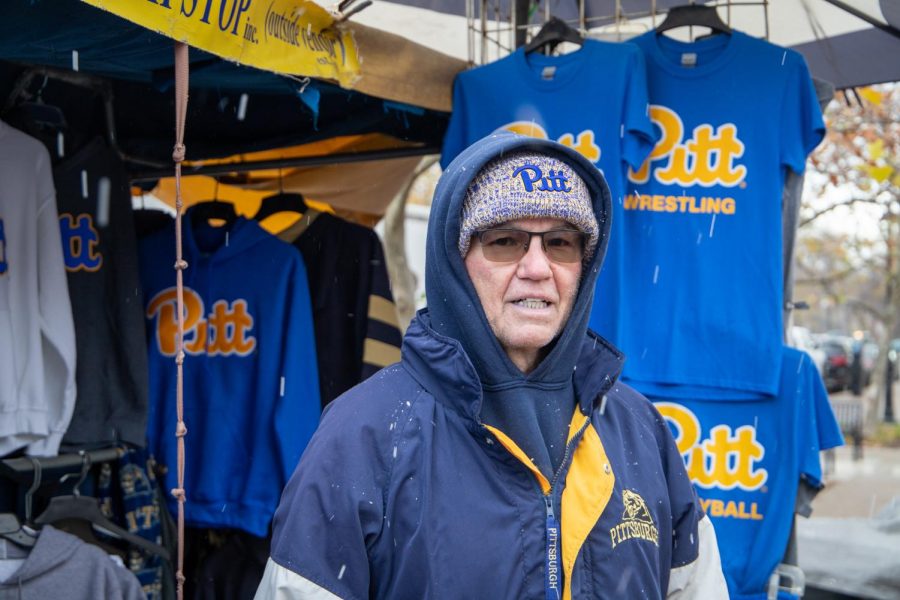Oakland businesses get creative to stay afloat amid pandemic


Chas Bonasorte, owner of The Pittsburgh Stop on the corner of Forbes Avenue and Bigelow Boulevard, stands in front of his apparel and merchandise stand.
Gidas Flowers has sold floral arrangements throughout Pittsburgh for more than 90 years, but owner Jason Gidas said the COVID-19 pandemic has threatened his livelihood.
In a normal year, Gidas sold flowers to more than 100 weddings. He only sold to 20 last year. This number is even bleaker, he said, because the weddings that did happen were in small venues or backyards rather than places like the Carnegie Museum or Soldiers and Sailors Memorial Hall.
“There’s really not much you can be doing actively because obviously a lot of our business is wedding-event-based hotel business,” Gidas said. “There’s no private events, there’s no weddings.”
And Gidas isn’t alone. Many stores in Oakland and across Pennsylvania closed temporarily in March and have adjusted to various social distancing restrictions throughout the summer and, most recently, with temporary mitigation restrictions during the holiday season. More than 30 million small businesses across the country are struggling in what is typically their busiest quarter.
In response, businesses such as Gidas have transformed the way they do business and relied more heavily on online sales. Even though his store’s online sales have increased since the pandemic began, Gidas still isn’t getting the same revenue because of the massive loss in weekly sales from large customers such as hotels.
Other Oakland businesses have also shifted toward more online sales. The University-owned stores — the University Store on Fifth, Maggie and Stella’s and The Pitt Shop — closed their doors in March. When the stores physically opened during August and September, they started a number of new projects to draw in business while instituting COVID-19 mitigation measures and site-specific safety plans to keep customers and workers safe.
Monica Rattigan, the executive director of stores and strategic initiatives, said University-owned businesses limited their in-store hours and closed for pickup and appointment-only shopping from Dec. 28 through Dec. 30. They instead focused on online sales and, according to Rattigan, had a successful Black Friday that was “better than normal.”
According to University spokesperson Julie LaBar, trends from the National Association of College Stores show nationally that university-owned stores have seen increases in online sales. She said online sales at the University have grown to 24% of total sales fiscal year-to-date and are almost 2% ahead of planned sales through October based on expected reduced store occupancy and traffic.
One of the other initiatives to mitigate COVID-19 and increase sales is a pickup window outside the University Store on Fifth. From the window, students can also pick up orders from any other campus store.
Rattigan said the University-owned stores also partnered with campus mailing services to deliver students’ orders directly to their residence halls. This partnership will continue in the spring semester.
“That was an indirect effort to make sure that students were able to get their course materials safely and conveniently,” Rattigan said. “So that’s been received really well.”
Not every business has, or needed to, shift to online sales, though. Chas Bonasorte, who owns and operates the Pittsburgh Stop at the corner of Forbes Avenue and Bigelow Boulevard, said his business did better than ever last year. Bonasorte attributes this success to students wanting to get out of their rooms and shop.
“Students are studying in Hillman to get out of their rooms,” Bonasorte said. “So they walk by me and look around and grab something, so I think sales are up because there isn’t much else to do.”
Bonasorte said much of his sales comes from students shopping for game day attire and other University merchandise. He said even though students have been off campus for much of this basketball season, basketball isn’t typically a prime selling time for him.
“I don’t see basketball affecting sales that much,” Bonasorte said. “Their uniforms don’t really change, and basketball doesn’t bring many people in anyways.”
The University-owned stores also saw a similar flux based on when students were on campus versus off campus. Rattigan said when students returned to campus in the fall, in-person sales were higher than expected, but less than a typical year. Rattigan said she expects this same surge of sales when students return to campus for the spring semester.
“As the semester gets kicked off, things are a little slower in September and October,” Rattigan said. “That was a typical trend that we would have seen any other year as well, so it started at the Pitt Shop, in all the stores, really, at the beginning of August when everybody’s moving in.”
Students can’t move into their dorms until at least the end of January, but Rattigan is still optimistic that Pitt’s stores will see a similar surge this semester.
Gidas is also hopeful that walk-in and online sales will help his business. He said he doesn’t know what else his business can do to increase revenue during the pandemic.
“We’ve just been trying to hold our own,” Gidas said. “There isn’t much you can be doing to actively sell more.”
Recent Posts
SGB introduces new governing code bill and addresses rumors of ICE on campus
At its weekly meeting at Nordy’s Place on Tuesday, Student Government Board introduced an omnibus…
Opinion | School should be in the summer
Although this may be controversial, I believe that from this data, it is evident that…
Weathering the storm: Pittsburgh teams have tackled some of the toughest environments
The end of the year in western Pennsylvania is always marked by two things —…
Notes From an Average Girl // Notes on Book Banning
In this edition of Notes From an Average Girl, senior staff writer Madeline Milchman writes…
To Be Honest // Yup, it is that damn phone
In this edition of To Be Honest, staff writer Evin Verbrugge writes about her phone…
Meaning at the Movies | Portraying Toxic ‘Adolescence’
In this edition of Meaning at the Movies, staff writer Lauren Deaton explores the mini-series…

